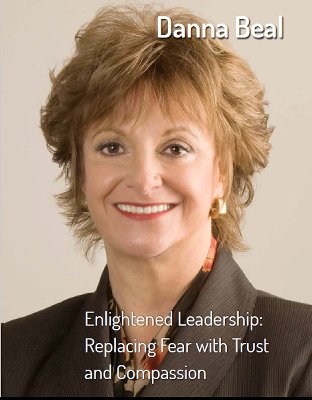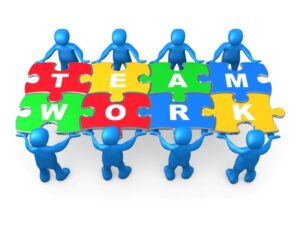 Guest post by Danna Beal.
Guest post by Danna Beal.
I have been a consultant for 20+ years working in hospitals, medical practices, CPA and law firms, banks, non-profits, government, retirement, hospitality, car dealerships, and education. Although each industry believed they were different, they actually had more in common than they differed. Many employees turn out to be suffering at work….
For many years, I provided mission/vision retreats, management and customer service training, motivational keynotes, and personal development courses: similar to what many others do. But in 2000 I had an awakening when I became fully aware of this suffering in many workplaces.
How do we suffer at work?
Everyone is afraid to speak of suffering in the workplace for fear of recrimination. But I often see a web of egos battling and competing for power, managers disempowering employees, coworkers sabotaging and hurting one another. We often create environments fraught with insecurity, fear, internal competition, rivalry, and gossip. In addition, it is a 24/7 world with high unemployment and frequent outsourcing. It is a double-edged sword because people need their employment to provide for their families so they feel they have to endure the suffering.
Is it really that bad? Let me share just a few examples:
A dedicated young woman has been teaching for 10 years in a large school district and students and parents love her. But she recently went on a leave with plans to return only on a part-time basis. The politics of her school district and the pressure to teach to certain tests (rather than give students that learning experience that she’s so good at) have exhausted her and her therapist recommends this change.
The assistant chief of a fire department, a 30-year veteran, is forced to give up his career because of extremely high blood pressure due to political stress and administrative backbiting and sabotage. Although considered a salt of the earth kind of person, the internal competition has depleted his energy as well as negatively impacted his health. He is only 53, much too young to feel forced into retirement.
A manager in a CPA firm who has great success with clients and in meeting her billable hours quota suddenly has a new senior manager to whom she reports. He is a highly critical person with a micromanager mentality. This new boss creates anxiety using high control and the manager begins doubting herself. She finds herself looking over her shoulder, hyper-vigilant and double-checking her work. Afraid to bill for extra work, her hours go down and her relationships with clients are weakened. She begins a confidential job search and the firm is surprised when she is leaving. They don’t know what happened that caused them to lose a great accountant.

Let’s wake up – and work together
I personally suffered sabotage in a previous workplace. As a marketing consultant in a large accounting firm, I worked with partners on building their clientele through marketing. One conservative partner was resistant and critical of marketing for a professional firm. He began subtly discounting me in meetings and was very dismissive whenever I spoke to him. I began avoiding him and rarely invited him to participate in our activities, in fear of rejection or ridicule. He increased his negativity toward the marketing program, which I took personally. I began doubting myself, fearing his sabotage when I was not present at meetings, and my energy got depleted. It was a turning point for me when I discovered his resistance was based in fear. This experience added to my desire to help others.
 As the outside consultant, I see the suffering of so many people. I dedicated myself to helping leaders create extraordinary workplaces with cultures of trust and compassion. I want to assist anyone to give up being a victim. My work covers a Personal Restoration Plan:
As the outside consultant, I see the suffering of so many people. I dedicated myself to helping leaders create extraordinary workplaces with cultures of trust and compassion. I want to assist anyone to give up being a victim. My work covers a Personal Restoration Plan:
This Personal Restoration Plan is about rebuilding relationships in the workplace by honoring the spirit in ourselves and in others that resides beneath our self-created identities that battle and compete for power and validation. This shallow interpretation of ourselves, a shabby imitation we have come to believe is true, belies our incredible authentic power.
One day, when fear can be replaced with trust and compassion for one another, there will be a shift in consciousness. People everywhere will be restored to their true identities, their inner spiritual greatness intended by the Creator. To that end, my work is dedicated.
My webinars about rebuilding relationships in the workplace by honoring the spirit in ourselves and others are accessible in the members area.
Although anyone at any time can awaken to their authentic power, the leaders of the organization have the power to build and/or change the culture. An extraordinary workplace begins with enlightened leaders who embody the qualities of the organizational vision and values; not simply dictate them. They operate from authenticity and strength of character rather than egos driven by the need for power and validation. At all levels, great leaders replace fear with trust and compassion. Teamwork, innovation, productivity, and efficiency emerge and thrive in a trusting atmosphere. Valued employees extend compassion and respect to customers and coworkers. Conversely, the old model of fear-based leadership results in internal competition and rivalry, blocking genuine cooperation and communication.
Authentic leadership is the process in which the spirit within the leader recognizes the same spiritual essence in those he/she leads. This recognition provides a conduit or channel of energy that propels everyone involved toward the dedication and action necessary to achieve goals. Enlightened leaders can be identified by their traits of vision, courage, compassion, integrity, and humility. They make decisions from integrity and respect for others, building loyalty and commitment.
Suggestions to enlightened leadership:
Look within: Be courageous and see your fears and weaknesses. Deep, honest self-reflection is the most crucial step in strengthening your inner spiritual greatness. Until you can recognize personal doubts and inadequacies, you will project them onto others. Unacknowledged fear becomes disguised as anger, impatience, grandiosity, or self-righteousness. It takes great wisdom and courage to own your imperfections and be accountable for yourself; it’s far easier to blame and shame others.
In my experience with the partner who discounted me, I finally had the courage to see that he hooked my own inner fear that I was inadequate or not qualified to help him.

Face your enemies: Learn about yourself when you encounter an enemy. Ask: Why am I reacting emotionally to this person or situation? What am I afraid it says about me? The face of the enemy changes based on our circumstances, enemies may be individuals, companies or nations. This is a chance to face the real enemy: our own fearful ego. The person or situation that brings up inner insecurities is actually a gift. As difficult as it is to realize, our perceived enemies teach us to respond from strength, rather than react in fear.
The critical accountant partner helped me face my fear of inadequacy. It set me free and led me to operate from authenticity. I was finally able to set up a meeting with him and communicate from my inner power. I gave up making him my enemy and he began trusting me. He had been afraid to participate in marketing and his resistance was his way to be safe.
Acknowledge and appreciate those you lead: Recognition and appreciation are basic human needs. Focus on others’ strengths rather than weaknesses. Consciously give credit and thanks to others, elevating and energizing them. Criticizing those being led depletes their energy and decreases their self-confidence. Demeaning others is like shooting a hole in the gas tank, draining the fuel that drives the organization, and wondering why we aren’t getting better mileage.
When I was the marketing director for a team of marketing reps, I bolstered the confidence of individuals for their individual strengths. I created an environment where everyone felt safe to contribute and empowered them to make decisions. We worked in alignment, respect, and enthusiasm. The team, through a process I call “group will”, achieved remarkable results in a very short period of time. Everyone had a sense of loyalty, ownership, and pride in the performance of the team.
Give up the need for external validation: Great leaders never take credit for others’ work and do not need external validation. They accept responsibility and even blame for unexpected consequences. Ego-driven leaders, fueled by artificial power and arrogance, like to claim victory, be the star, control others, and appear superior. These behaviors cause insecurity, distrust, anger and doubt in others. Dysfunction, drama, and sabotage erupt, limiting the achievement of organizational goals.
I discovered that accumulating awards and recognition, was not nearly as satisfying or enriching as helping others work as a team. When I was younger I sought recognition and superiority. But I came to realize that self-glorification was dividing and built walls of competition instead of cooperation.
Be open-minded and approachable: Be present and genuinely listen to others by first giving up judgment, pre-conceived ideas and personal biases. Start from a place of equality and respect, regardless of titles or positions. Invite others to contribute. Be willing to be wrong or to not have all the answers.
If people agree with you to validate your ego the organization is deprived of new ideas and innovation.
It can be tempting to seek people who agree with you. When I gave up judging what others might know or are qualified to do, I opened the door to diverse and creative ideas. In meetings, I know I don’t have all the answers and we need everyone’s input. Some of our best contributions have been from front line workers.

Business is about people
What looks like leadership is often based on artificial power. Enlightened leaders are operating from authentic power, which is love. Love is power that sustains all life and shines equally on everyone. It is not weakness but the highest level of genuine strength and power.
In spite of all the serious business goals, workplaces are comprised of people interacting with each other. Business success is completely dependent on human beings, their relationships, and how they work together toward the goals. My experience is that people reach extraordinary levels when they work in an atmosphere of trust and compassion.
As leaders, consultants, HR professionals, I challenge you to notice the ego behaviors in organizations, but not be deceived, confused, or beguiled by them. Recognize a problem that often goes untreated and instead, help those who are controlled or demeaned by the dysfunction. I believe kindness is in short supply in the workplace and by being kind, you can help liberate millions of people from an invisible form of slavery. But to do this, we must first embody the powerful traits of enlightened leadership.
- Where do you currently see egos at work?
- What or whom threatens you? Why?
- In what areas do you need external validation?
- How do you appreciate others around you?
Danna Beal, M.Ed. is an author, international speaker, and workshop leader. She is the owner of Danna Beal Consulting LLC, Bellevue, WA and published the book “The Extraordinary Workplace: Replacing Fear with Trust and Compassion”
Danna’s webinars about Enlightened Leadership are accessible in the members area.
